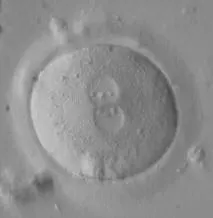
A fertilized human egg
What is ICSI?
Intracytoplasmic sperm injection, or ICSI, is a technique developed to help achieve fertilization for couples with severe male factor infertility or couples who have had failure to fertilize in a previous in vitro fertilization attempt. The procedure overcomes many of the barriers to fertilization and allows couples with little hope of achieving successful pregnancy to obtain fertilized embryos. In 1993, a Belgium fertility group reported the world’s first live birth as a result of ICSI. The Family Fertility Center implemented ICSI in 1995 and reported its first ICSI live birth in 1996.
How Does ICSI Work?
The technique involves a series of precise maneuvers performed under microscopic magnification to pick up a single live sperm and inject it directly into the interior of a human egg. The procedure requires that the female partner undergo ovarian stimulation with fertility medications so that several mature eggs develop. These eggs are then aspirated through the vagina, guided by vaginal ultrasound. After the eggs are harvested, each egg must be treated with a solution containing hyaluronidase, an enzyme which loosens and removes most of the cumulus cell surrounding the egg. This is followed by mechanically stripping the remaining cumulus cells off each egg. Stripping has to be done quickly yet gently so the egg is not harmed. Once stripped, the eggs are examined to see if they are mature. Only mature eggs will be injected with a sperm. The semen sample is prepared as described in intrauterine insemination section. The sperm preparation process separates live sperm from debris and most of the dead sperm. The embryologist searches under the microscope at 200 to 400 x magnification for a single normal or near normal appearing live sperm, immobilizes the sperm, picks it up in an extremely thin glass needle, and gently injects it directly into the egg.
Intracytoplasmic Sperm Injection
ICSI for Male Factor Infertility
ICSI is considered absolutely necessary in the case of male factor infertility with a moderately to severely abnormal semen analysis. The negative effects of abnormal semen characteristics and sperm quality on fertilization can be overcome with ICSI if viable sperm are available because the technique bypasses the shell around the egg (zona pellucida) and the egg membrane (oolemma) to deliver the sperm directly into the egg. ICSI allows couples with male factor infertility to achieve fertilization and live birth rates close to those achieved with in vitro fertilization (IVF) using conventional methods of fertilization in men with normal sperm counts. ICSI can be performed even in men with no sperm in the ejaculate if sperm can be successfully collected from the epididymis or the testis.
Success of ICSI
Through the ICSI procedure, many couples with difficult male factor infertility problems have achieved pregnancy at the Family Fertility Center. Fertilization rates of 80-85% (of all the mature eggs injected), almost as good as fertilization with normal sperm, are currently being achieved. That is to say, on average for every ten eggs, 8 eggs will fertilize normally. Pregnancy rates are comparable to those seen with IVF in couples with no male factor infertility.
ICSI for Other Indications
Approximately 75% of all IVF cases done in the U.S. are now ICSI. Patients are electing to undergo ICSI for reasons other than male factor infertility. Those reasons include previous poor fertilization with IVF, variable sperm counts, unexplained infertility or avoiding transmission of a contagious viral infection, e.g. HIV infection, in the male partner. Thus, many patients choose to undergo the ICSI procedure to maximize their success even when the procedure may not be clearly indicated. Of note, ICSI will not improve pregnancy rate for poor oocyte quality.
Risks of ICSI
Intracytoplasmic Sperm Injection: What are the risks?
www.ncbi.nlm.nih.gov/pmc/articles/PMC2424218/
Schedule a Consultation
Contact Us
If you are experiencing a medical emergency, call 911 or go to the nearest emergency room.
We understand you may have a lot of questions. Additionally, each couple or individual has a unique set of circumstances. To this end, the best way to get answers for your situation is a face-to-face consultation with our physician.
Schedule a Consultation
Contact Us
If you are experiencing a medical emergency, call 911 or go to the nearest emergency room.
We understand you may have a lot of questions. Additionally, each couple or individual has a unique set of circumstances. To this end, the best way to get answers for your situation is a face-to-face consultation with our physician.











